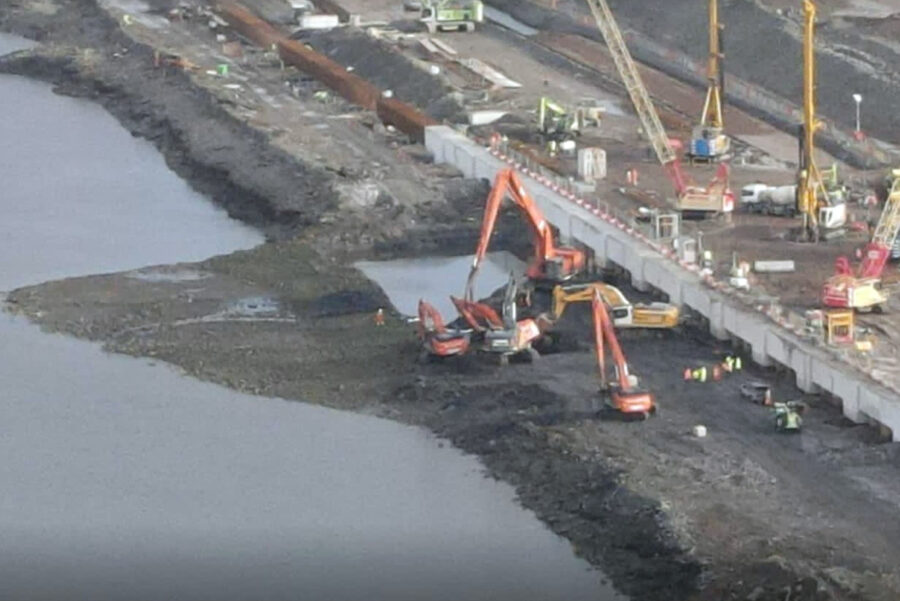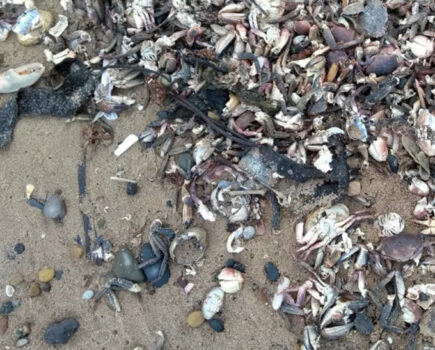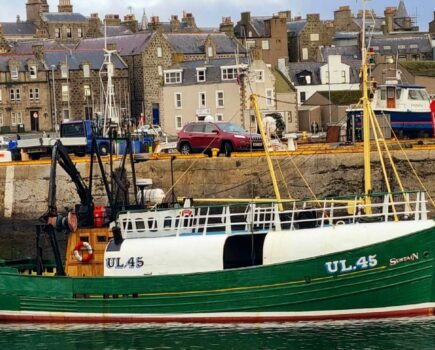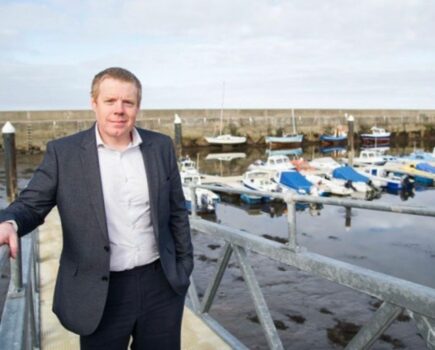Fishermen are reporting that die-offs of shellfish and mass wash-ups of dead marine life on local beaches have ‘vastly’ increased since dredging in the river Tees resumed on 1 September, reports Tim Oliver.
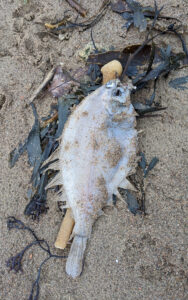
One of many photos of dead fish washed up on beaches
in the Tees region that have been submitted to the EFRA Committee.
Stan Rennie, chairman of the Hartlepool Boatmen’s Association, has sent evidence including many photographs and videos to the Environment, Food and Rural Affairs (EFRA) Committee that is examining the die-offs, which have been occurring for over a year in the Tees to Whitby coastal region.
Defra and government agencies have blamed an algal bloom for the deaths, but fishermen believe they are due to the dumping of contaminated dredge spoil.
Defra has set up an independent panel to investigate the problem, but the North East Fishing Collective (NEFC) has called for an immediate halt to dredging while investigations continue (Fishing News, 8 December, ‘Call for action as shellfish deaths continue’).
The EFRA Committee heard from a wide range of witnesses including Stan Rennie, who has now sent more evidence to the committee to support fishermen’s claim that contamination by chemicals, including pyridine, is causing the deaths.
The committee met again on Tuesday last week, when the die-offs were on the agenda.
Stan Rennie told the committee that the phase one Tees Freeport dredging had ‘vastly increased’ the die-offs and washing up of dead marine life since it began on 1 September.
He said toxic material had spread into the river, with die-offs of whelks, sprats, shrimps, mussels and fish ‘by the beachful’ being reported as far south as Scarborough.
“These are this year’s life, so let’s not blooming pretend algae killed them,” he told the committee.
“Now there are dead lobsters and crabs in the pots again, as well as scallops and prawns. I was at sea bringing gear in for a colleague two days ago – five lobsters caught were dead, and the day before, two were dead.”
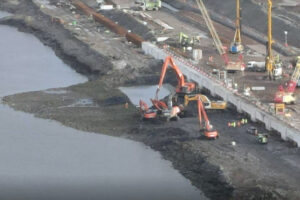
Excavation work underway as part of the new Tees Freeport.
He said that phase two of the dredging has now started and 700,000t will be dumped at sea by 23 March, and a further million tonnes after that in phase three. No tests for pyridine are being carried out, and other toxins were over the limits, he claimed, but ‘rules are overridden because of where we live – we live in a toxic place, so the toxic dredge can just go out and kill what’s left’.
“No mitigation measures can be put in place. It’s a die-die situation for the sea and the industry – we are both being sacrificed by agency and environmental protection shortfalls!”
He asked the EFRA Committee to ascertain whether the independent expert panel has been established, who is on it, whether investigations have begun, and the expected timescale for its report to be published.
Dredging should be stopped until further tests are carried out, he said. Scientists from universities on behalf of NEFC had independently tested the whole of the affected seabed and riverbed, and ‘all but two samples tested positive for deadly pyridine’. The two that didn’t were from the opposite side of the river to the Freeport.
“How dare the agencies say the testing will be too expensive – we’ve paid for our tests,” Stan Rennie told the committee. “If the public of the North East are not worth spending on, and the North East coast is not worth saving, then hold the Freeport dredge and we’ll raise the money.”
He concluded: “Your decision is critical if there is to be any fishing heritage and industry left, not just for us, but for future generations.”
Stan Rennie told Fishing News: “The environmental consequences of all of this Freeport dredge work totally doesn’t mean anything to the government agencies. The environment and fishing industries will be sacrificed when the 1.7m tonnes of toxic dredge is dumped six miles offshore.”
MPs query terms of shellfish deaths review
MPs have called on Defra secretary Thérèse Coffey to provide more information on the independent committee Defra has set up to investigate the mass crustacean die-offs.
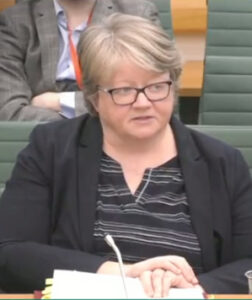
Defra secretary Thérèse Coffey giving evidence at the EFRA Committee, where she said she was ‘not intending to have a brand new, huge inquiry’.
They have also called on the government to conduct the review ‘in a more open, transparent and collaborative way’.
The calls come in a hard- hitting letter from Sir Robert Goodwill, chairman of the EFRA Committee, to the Defra secretary following her appearance before the committee on 6 December, where she was quizzed about the independent panel.
The committee had previously asked the independent panel to review the evidence for the algal bloom and pyridine poisoning theories to explain the deaths. They also asked for government and agency experts and scientists to work together in an ‘open and collaborative way’ to ‘rebuild trust and work towards a consensus’.
But Robert Goodwill told Thérèse Coffey that in her appearance before the committee on 6 December she was ‘unable to explain how the members of the panel will be chosen, nor provide details about its current or expected composition’.
He wrote: “The exact terms of reference of the review are unknown. The committee has also been shown emails from an official involved in the inquiry which states that membership of the panel will not be shared outside of government until the panel has published its findings.
“The committee feels that this falls short of the collaborative process that we envisaged for this review. This lack of transparency and communication is unlikely to build trust with scientists who have been critical of the previous Defra report and the local community, which feels that its concerns have not been listened to. Indeed, the current approach risks making this conflict worse.
“We call on the government to conduct this review in a more open, transparent and collaborative way. As a minimum – and before the end of the year – the government should publish the panel’s terms of reference; its membership; and a document setting out the panel’s ways of working – including how it will ensure all viewpoints will input into the panels’ work.”
The EFRA chairman also asked the Defra secretary to confirm that the final report will be published ‘in its entirety’, and that while Defra’s chief scientific adviser is leading on the appointment of members to the panel, the government’s chief scientific adviser has been consulted on them.
“Given the urgency of this issue and the timescales you have set for this project’s completion, we would appreciate a response to this letter by 20 December,” concludes the chairman.
During her evidence to the EFRA Committee, Liverpool MP Ian Byrne asked Thérèse Coffey how the panel members would be chosen and what the timescales were for it reporting back.
She said she had asked her scientific adviser ‘to make sure I have a report in January’.
Ian Byrne questioned how the panel could be independent if scientific advisers from Defra were setting it up. The Defra secretary replied: “I am leaving that to the scientific adviser to work out, but a lot of work has been done on this already. The committee heard from a particular academic and about concerns locally. We committed to having a review. I am not intending to have a brand new, huge inquiry. It has to be timely.”
Ian Byrne told the chairman he was ‘not filled with any confidence that that is independent’.
Defra permanent secretary Tamara Finkelstein, who attended the session with Thérèse Coffey, said the chief scientific adviser ‘has not been involved in any way’ and ‘is bringing panel members together who have not been involved in any way to build that independence’.
She said they would be people ‘from outside the department and people who have not been involved so far’. She added: “The wish is to do this speedily. We are able to do that by him bringing those people together. We can produce a report for the secretary of state by January.”
This story was taken from the latest issue of Fishing News. For more up-to-date and in-depth reports on the UK and Irish commercial fishing sector, subscribe to Fishing News here or buy the latest single issue for just £3.30 here.

